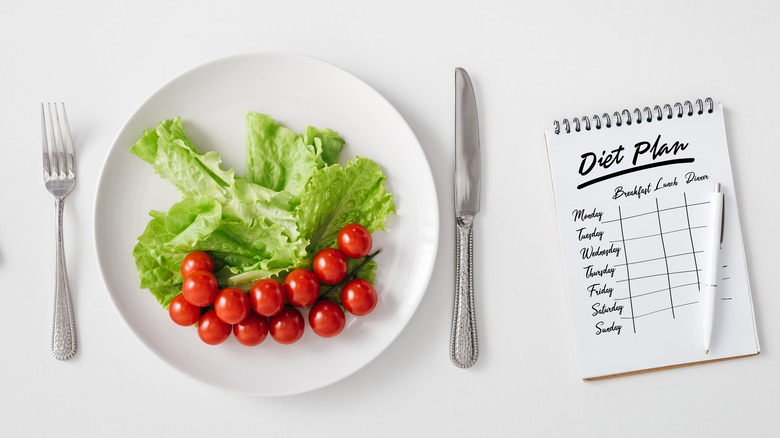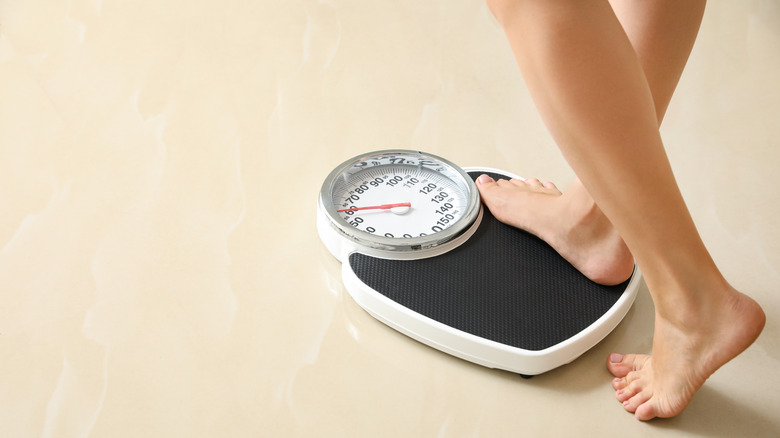Health Mistakes Women Don't Realize They're Making
We may receive a commission on purchases made from links.
Do you ever skip doctor appointments, ignore pain, or neglect to schedule life-saving vaccines? While you are probably doing your best to follow a healthy lifestyle, we're guessing there's room for improvement. Eating well and exercising regularly may already be part of your daily routine, but it's likely that you also have some not-so-healthy habits, some of which may not even be on your radar as problematic. Whether you are aware of them or not, health mistakes can be harmful and lead to serious consequences.
The World Health Organization identifies a number of top health concerns for women, including cancer, reproductive health issues, and mental health conditions like anxiety and depression. In the United States, the National Conference of State Legislatures also cites diabetes, osteoporosis, and Alzheimer's disease as common health issues affecting women.
While a healthy lifestyle can help prevent many health conditions, women often experience challenges when it comes to taking care of themselves (via Cleveland Clinic). With a wide range of family, work, and social responsibilities, it probably comes as no surprise that women often put themselves on the back burner. Instead, we encourage you to take some time right now to reprioritize your health. Below, we cover common health mistakes that women don't realize they're making.
Mistake: Not eating enough
Are you meticulous about counting calories, carbs, or grams of fat? Unfortunately, many equate limiting their food intake with being healthy. Restrictive eating can be harmful when it leads to undereating, nutritional deficits, and eating disorders. According to Livestrong, your body goes into "starvation mode" when you don't eat enough. Starvation mode is when the metabolism slows to preserve enough calories for essential functions like breathing and blood circulation. If you're cutting calories to lose weight, you should be aware that not eating enough can actually place you at risk for weight gain instead of loss, and many other health complications, including organ failure.
Instead of limiting food quantity, some women believe that restricting certain foods entirely is the way to go. The "clean eating" movement is one example of this approach. The problem with clean eating is that focusing on foods as either "clean" or "dirty" isn't necessarily healthy. In many ways, this can be viewed as just another form of dieting, which is an important predictor of eating disorders, according to the National Eating Disorders Association.
Other women may choose to skip meals or participate in intermittent fasting (eating within only allotted time periods). However, Eating Well reports that going too long without eating can lead to increased anxiety, lower energy levels, increased cravings for sugar and carbs, and digestive problems. It can also result in nutritional deficiencies and place you at risk for eating disorders. Bottom line? Make sure that you're receiving adequate nutrition through a healthy, well-rounded diet.
If you are struggling with an eating disorder, or know someone who is, help is available. Visit the National Eating Disorders Association website or contact NEDA's Live Helpline at 1-800-931-2237. You can also receive 24/7 Crisis Support via text (send NEDA to 741-741).
Mistake: Thinking cardio is the only necessary form of exercise
We all know that exercising regularly benefits our health. But do you follow a well-balanced exercise routine? The American Heart Association recommends getting at least 150 minutes of moderate, or 75 minutes of vigorous, aerobic exercise each week, along with at least two days of strength training.
Although many women may swear by cardiovascular activities such as walking, running, biking, and swimming, incorporating all five of the following elements into your fitness routine can improve your health: aerobic activity, strength training, core exercises, balance training, and flexibility and stretching exercise (via Mayo Clinic).
While the benefits of strength training are particularly well-documented, you don't necessarily need to head to the gym. Strength training can involve the use of free weights, weight machines, resistance bands, or bodyweight. No matter which method you choose, strength training builds muscle mass, supports weight management, improves cardiovascular health, and leads to better mental health. Plus, it can even help you live longer (via Women's Health).
Mistake: Not getting enough sleep
You may already know that sleep can impact your physical, emotional, and cognitive health. While not getting enough sleep can be unavoidable at times, it's generally recommended to prioritize sleep for the sake of your overall well-being. According to Medical News Today, sleeping seven or more hours each night (for adults aged 18 to 60) improves productivity and concentration, reduces risks for weight gain and heart disease, and strengthens the immune system.
If you're having trouble getting a good night's rest, establishing good sleep hygiene can help. The Centers for Disease Control and Prevention suggests going to bed and getting up at consistent times, ensuring your room is quiet, dark, and comfortable, and avoiding caffeine, alcohol, and large meals before bedtime. They also recommend removing electronic devices from the bedroom.
If you're wondering how screens can impact sleep, there are multiple explanations. First, sleep disorders specialist Dr. Walia told the Cleveland Clinic, "Checking your phone stimulates the brain so we are more active and awake." Additionally, exposure to blue light from screens can suppress melatonin, a hormone that naturally controls your sleep cycle. Finally, becoming emotionally triggered by something you read or see online can leave you wide awake, delaying precious REM sleep.
Mistake: Eating a lot of fast food
You want to eat healthy meals, but you're just too busy to plan them out. Too often, you find yourself going through the drive-thru or shoveling down what's left on your kids' plates. Over time, these habits can lead to weight gain, diabetes, metabolic syndrome, and other dangerous health issues. Fortunately, Lifehack offers helpful tips on meal planning for busy people. They suggest using a slow-cooker once or twice a week, buying a rotisserie chicken every Sunday, doing advance meal prep, and doubling recipes so that you'll have leftovers.
For anyone who tends to clean their kids' plates on top of their own, be aware that those extra calories can really add up over time. Instead, try serving children appropriately sized portions and saving leftovers for a future meal, and make sure that you're eating enough of the right foods during mealtimes, according to health coach Brooke Selb (via Wrecking Routine).
Finally, cut yourself a little slack if you can't always prepare healthy meals. Christy Brissette, registered dietitian, recommends the 80:20 rule: "Eat healthy foods as often as possible (at least 80 percent of the time), but also enjoy the occasional less healthy food (less than 20 percent of the time), if that's what you really want" (via The Washington Post). That said, keep in mind that eating fast food more than once a week has been linked to obesity, and eating fast food more than twice weekly may increase your risks for metabolic syndrome, diabetes, and death from heart disease, per WaPo.
Mistake: Accepting weight gain as a normal part of aging
Although women tend to gain weight as they get older, that doesn't mean you should accept weight gain as inevitable (via Centers for Disease Control and Prevention). While it may be more challenging these days, maintaining a healthy weight throughout your entire life is important.
Having obesity or overweight can place you at risk for a range of dangerous health conditions, including high blood pressure, diabetes, heart disease, stroke, and cancer. Along with impacting your physical health, carrying around extra pounds can affect your mental health and reduce your overall quality of life. This may lead to serious issues like anxiety and depression, according to the CDC.
The CDC further revealed that it may be helpful to weigh yourself regularly if you plan to lose weight and keep it off. And don't underestimate the power of exercising. "Regular physical activity can reduce your risk for many chronic diseases and help keep your body healthy and strong," the CDC confirmed. "This makes it more likely you'll maintain your weight."
Mistake: Skipping out on sun protection
Now, you may be thinking you've got this one covered. After all, you slather on sunscreen while at the beach or pool every summer. While that's a good start, it is critical for your health to be mindful of sun protection year-round and in all types of weather. Even on cloudy days, up to 80% of ultraviolet (UV) rays can penetrate your skin, according to the American Academy of Dermatology Association (AAD).
Skin cancer is the most common type of cancer in the United States, impacting one in five individuals at some point in their lives. An estimated 9,500 people are diagnosed with skin cancer each day, and more than a million are living with melanoma. Women under age 50 are more likely than men under 50 to develop skin cancer (via AAD).
To prevent skin cancer, the Skin Cancer Foundation recommends applying SPF 15 sunscreen every day. This simple act reduces your risk of squamous cell carcinoma by about 40%, and melanoma by 50%. Another benefit of using sun protection is that it helps prevent premature wrinkles, saggy skin, and age spots caused by the sun. Can't stand wearing sunscreen? Try experimenting with different types and brands. You can also wear sun-protective clothing such as broad-brimmed hats, tightly woven fabrics, darker colors, and full-body swimwear (via Prevention). And don't forget UV-blocking sunglasses!
Mistake: Missing annual health screenings
When's the last time you visited the doctor? When it comes to prevention, we cannot stress enough the importance of routine health screenings. For most women, this includes annual well-woman exams and mammograms, along with regular pap smears (usually every three to five years).
During an annual check-up, an OB/GYN or nurse practitioner is available to discuss sexual and reproductive health concerns, perform a physical exam, and conduct a pap smear when needed. A pap smear is a test used to detect cervical cancer, explained Johns Hopkins Medicine. According to the American College of Obstetricians and Gynecologists, your doctor may also choose to provide counsel on following a healthy lifestyle and minimizing health risks during your visit.
For early detection of breast cancer, the American Cancer Society recommends annual mammograms for all women between ages 45 and 54. Those aged 40 to 45 should have access to mammograms if desired, and women over 55 can switch to screenings every two years.
Mistake: Ignoring pain
Perhaps a recent injury is taking too long to heal, your backache is getting worse, or you are experiencing frequent headaches. You may feel too busy to deal with it, or believe that pain is just a normal part of aging. It's true that women are more likely to experience chronic pain, but that doesn't mean you should needlessly suffer (via Cleveland Clinic).
"Pain is the body's red alert," explains Dr. Anne Louise Oaklander, an associate professor of neurology at Harvard Medical School, told WebMD. Whether pain in the body manifests as migraines, a sore back, or stiff joints, women should always consult their doctor when something seems wrong. They can explore potential causes, along with making personalized treatment recommendations.
When left untreated, pain can impact mobility and the ability to perform normal daily activities, which can lead to premature death (per Medical Guardian). If you are experiencing chronic pain, please contact your doctor as soon as possible. Early diagnosis and treatment usually lead to the best health outcomes.
Mistake: Taking too many supplements
Most health experts recommend meeting nutrition needs with food, as opposed to dietary supplements. According to the Mayo Clinic, whole foods provide greater nutrition, essential fiber, and protective substances like antioxidants. That said, there may be times when supplementation is beneficial. Before taking matters into your own hands, it's a good idea to check in with your doctor. Surprisingly, there exists little evidence that supplements protect against serious health conditions like cardiovascular disease or cancer (per Harvard Health).
According to Everyday Health, some women may benefit from certain supplements, including calcium, fish oil, folate, B vitamins, CoQ-10, vitamin D, and lutein. Calcium and vitamin D are known for keeping bones strong, folate protects against birth defects, and Omega-3 fatty acids may protect against heart disease (via National Institutes of Health Office of Dietary Supplements).
Taking the wrong supplements, or even too many of the right ones, can be harmful to your health. Some supplements lead to serious side effects, especially when taken in large amounts. One potential effect is increased bleeding, which can be dangerous, according to the Office of Dietary Supplements. Supplements can also interact with medications, decreasing their effectiveness. Consult your doctor or pharmacist about potential interactions with antidepressants, heart medications, or birth control pills.
Mistake: Avoiding flossing
When you just want to get to bed or need to rush off to work in the morning, it's easy to put off this important health habit. If you don't think it's that important, think again. According to a statement by the U.S. Department of Health and Human Services to the American Dental Association, "Flossing is an important oral hygiene practice. Tooth decay and gum disease can develop when plaque is allowed to build up on teeth and along the gum line. Professional cleaning, tooth brushing, and cleaning between teeth (flossing and the use of other tools such as interdental brushes) have been shown to disrupt and remove plaque."
Still making excuses? WebMD highlights common justifications – bleeding gums, not enough time, or challenges with the act itself — along with ways to overcome them. If you're in need of flossing tips, Colgate also provides some helpful suggestions like flossing daily, using 18 inches of floss, and flossing beneath the gum line. If you just can't get the technique down, you can try using floss picks or a water flosser to clean between your teeth.
Mistake: Drinking too little water
How much water do you drink each day? Proper hydration is key to maximizing physical performance, boosting energy and cognitive function, losing weight, and preventing a range of health problems, according to Healthline. A long-established general guideline for water intake has been to drink eight 8-ounce glasses (64 ounces) daily, but needs can vary based on sex, weight, age, environment, and activity level. Pregnancy and breastfeeding can also impact how much fluid your body requires. The U.S. National Academies of Sciences, Engineering, and Medicine suggest women drink 11.5 cups, or 92 ounces (via Mayo Clinic).
To ensure that you are drinking enough, try filling up water bottles each morning with your daily recommended amount. Just be sure to properly clean your water bottles each night –– and no, a quick rinse is not adequate. According to the Food Network, skipping daily washings can lead to the growth of harmful bacteria. The best bottle washing option is to place it in the dishwasher, but you can also hand wash with soap, water, and a bottle brush. Make sure you dry the bottle upside down.
If you're not a big fan of plain water, consider drinking unsweetened, non-caffeinated beverages instead. For instance, herbal teas and seltzer water may be good options. If you rarely feel thirsty and your urine is colorless or light yellow, you are probably well-hydrated. Keep it up!
Mistake: Giving into peer pressure
We probably all have that one friend who we blame for derailing our diet and workout plans. You know, the one who insists on going to happy hour instead of the gym, who pokes fun of you for ordering a salad, or who pushes for ordering dessert even when you're already stuffed. While such occasions can be challenging, the good news is that you don't need to blow off your friends to stay healthy.
The Cleveland Clinic provides healthy tips on navigating dinner out with friends. They recommend being more mindful by deciding how much you're going to eat in advance, following through on those decisions, and focusing on how your food smells, looks, tastes, sounds, and feels as you eat. Your healthy practices may even rub off on your peers, making things easier at future outings.
What you choose to drink also matters. If you're heading out for happy hour, you may wish to opt for lower-calorie drinks, alternate rounds of alcohol with water, and set limits on how long you'll stay (via Health). Better yet, you can skip happy hour altogether and gather in healthier ways, like meeting a friend for a walk or taking a group exercise class at the gym.
Mistake: Avoiding the incontinence conversation
Let's be honest: It's easier to talk about some health problems over others. A poll cited by WebMD showed that 43% of women in their 50s and 60s experience urinary incontinence, but two-thirds admitted to not telling their doctor. According to the Mayo Clinic, urinary incontinence can be an occasional problem, such as leaking a little urine when you sneeze, or a major issue involving sudden urges and frequent accidents. When urinary incontinence impacts your ability to participate in normal activities, it is likely time to get help.
Similar to the WebMD poll, a research study by JAMA Internal Medicine suggests a high prevalence of urinary incontinence in women aged 30 to 90, with 45% affected. Prevalence increases with age, higher BMI, additional health issues, and major depression. Pregnancy, childbirth, and menopause can increase your risk (via Women's Health).
Although your doctor should be consulted, treatment for urinary incontinence can begin at home with Kegel exercises and timed bladder training. Lifestyle changes such as losing excess weight, avoiding caffeine and alcohol, and quitting smoking can also be helpful. Potential medical treatments include medications, devices to support pelvic floor muscles, and surgery.
Mistake: Swearing off hormones
Although some women may wish to avoid taking hormones, they can be beneficial for your health. In early adulthood, hormonal birth control can help prevent unplanned pregnancy, reduce your menstrual flow, and provide relief from painful cramps, according to the American Society for Reproductive Medicine. Additionally, WebMD confirmed that hormone replacement therapy (HRT) can alleviate uncomfortable menopause symptoms like hot flashes and vaginal dryness. Life stages for women that involve changing hormones include puberty, pregnancy, breastfeeding, and menopause.
How do you know when hormones are out of balance? The best way to know is to contact your doctor. There are many potential symptoms, which can vary from person to person. You may experience abnormal menstrual cycles, acne breakouts, hair loss or excessive growth, headaches, and night sweats (per Healthline). Other signs include weight gain, fatigue, muscle aches or weakness, joint issues, and decreased sex drive.
While some issues may feel difficult to broach with your doctor, we encourage you to do so. They will work closely with you to identify any underlying health issues, and develop a personalized treatment plan.
Mistake: Not getting vaccinated
Science proves that vaccines save lives. Available COVID-19 vaccines, for example, have been proven to be safe and effective in preventing people from becoming sick or seriously ill with COVID-19 (via CDC). As of this writing, the Pfizer COVID-19 vaccine has been authorized for use by the U.S. Food and Drug Administration (FDA) and the Moderna and Johnson & Johnson COVID-19 vaccines are FDA-authorized. Individuals 12 and older are strongly advised to get vaccinated (via CDC).
It is also important to schedule your annual flu (influenza) vaccine. This preventative measure is recommended for everyone aged 6 months and over (via Mayo Clinic). Children age 8 and under may require two doses. For those between 2 and 49 years old, a nasal spray alternative is available. The best time to book your flu shot is in early fall before the start of flu season, according to CVS Pharmacy.
Ask your doctor about additional vaccines you may benefit from, including those protecting against tetanus, pneumonia, and cervical cancer (via The Woman's Clinic).















